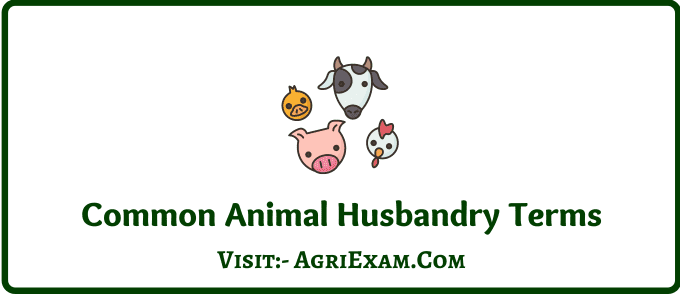Common Animal Husbandry Terms

Buller or Nymphomaniac:- A cow apparently always in heat.
Back crossing:- Mating of crossbred back to one of the pure parents used to produce it.
Balanced ration:- Ration that contains all the nutrients in right proportions and quantities is called balanced ration.
Bull Calf:- A male calf under one year of age.
Bull:- It is un castrated sexually matured male of the species.
Bullock:- Castrated male Ox.
Calf starter:- Concentrate feed offered to the young calves after 2 weeks of age.
Calf:- A young animal of bovine species under one year of age.
Casting:- It is throwing down the animal and securing the limbs for various purposes like surgical operations, castration, hoof trimming, shearing etc.
Castration:- It is the removal of testicles.
Challenge feeding:- The practice of feeding higher levels of concentrate to challenge the cow to reach her maximum milk production.
Concentrates:- Feeds that contain less than 18% crude fibre are called concentrates such as grains, oilcakes, grain by products etc.
Cow:- It is a female of bovine species that has calved at least once.
Crisscrossing or Rotational crossing:- Mating of a hybrid to three established breeds in a rotational manner.
Cross breeding:- A system of breeding between two established breeds.
Cryptorchid:- A male animal in which one or both the testicles fail to descend into the scrotal sac.
Culling:- Removal of undesirable or unproductive animals from herd.
Deticking:- Removal of the external parasites like ticks, lice, mites present on the body surface of animal.
Deworming:- Removal of the internal gastro intestinal parasites from the body.
Disbudding:- Removal of the horn buds of the calf by mechanical or chemical methods to arrest growth of horns.
Dry period:- The time interval between date of drying off the cow to the date of next calving.
Energy feeds:- Feeds containing less than 20% crude protein are called energy feeds.
Free martin:- When twin calves of different sexes are born, the bull calf is normal whereas the heifer calf is sterile. The sterile heifer calf is called freemartin.
Gestation period:- The period of pregnancy in animals.
Grading up:- Systems of breeding in which pure bulls are used for improvement in non descript females for several generations.
Heifer calf:- A female calf under one year of age.
Heifer:- A female individual that has not yet calved.
Inbreeding:- A system of breeding between very closely related animals.
Inheritance:- Transmission of genes from parents to the offspring in next generation.
Intercalving period:- No of days between two successive calvings.
Lactation Curve:- The graphical representation of the rate of milk secretion during lactation is called Lactation Curve.
Lactation length:- The time interval between the date of calving to the date of drying the animal expressed in days.
Maintenance ration:- A ration given daily to the animal to maintain in resting non production condition with good health.
Open animal:- Female animals that have not been bred.
Parturition:- Act of delivery in animals.
Pasture:- Fodder crops grown on the land for grazing animals.
Pedigree Bull:- The bull whose ancestral record is known.
Persistency:- Ability of the animal to sustain good daily milk is for a longer period i.e, the slope of descending phase of lactation curve is known as Persist-ency.
Phenotype:- The visible character of an individual animal.
Production ration:- A portion of the ration given daily in excess of maintenance requirement for purpose of growth, production and work.
Protein supplements:- Feeds that contain 20% or more protein are called protein supplements.
Ration:- The total amount of feed that an animal is offered during a 24 hour period of time is called ration.
Roughage:- Feeds that contain more than 18% crude fiber are called roughage such as hay, silage, fodder etc.
Scrub Bull:- It is non-descript type of stray village cattle.
Selection:- The process of including certain animals in a population for becoming parents of next generation.
Service period:- The period between parturition to successful conception expressed in days.
Silage:- Freshly cut green forages cut and offered to the animals.
Stud Bull:- Bull that is used for breeding purposes.
Test cross:- Mating of a crossbred back to its recessive parent.
Variation:- It is a tool to measure differences of character or trait between animals.
Weaning:- Separation of the calf from the cow and feeding them artificially.
| More Agriculture Study | Click |
| Agriculture Exam Online Test | Click |